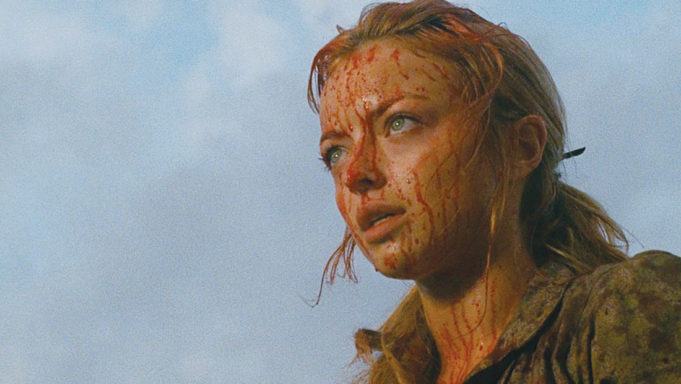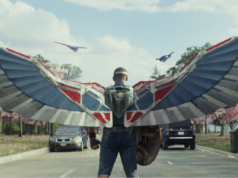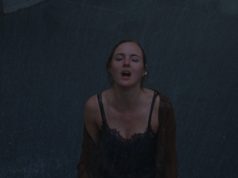In the way that sharks come with remoras and roadkill with crows, Quentin Tarantino films are usually followed with a tail of aesthetic imitators varying in both budget and quality. Stuff like Eight Heads in a Duffel Bag or Suicide Kings or Hellride or Way of the Gun will occupy screens for several years until the pastiche auteur announces that he’s making a new movie. Low-budget Western Outlaws and Angels has enough stylistic call-backs to Tarantino’s Hateful Eight to seem, superficially, like a knockoff. But dismissing this film as such overlooks the thematic concerns that make it its own.
Written and directed by commercial director JT Mollner, making his feature-length debut, Outlaws and Angels stars Chad Michael Murray as Henry, a bandit on the lam with his gang after committing a robbery that leaves two people dead. Accompanied by sadistic gunman Samuel (Marty Lindsey) and simple-minded ex-Union soldier Little Joe (Keith Lonneker), Henry finds his way to an isolated farmhouse inhabited by the Tildons, a family of four led by preacher George (Ben Browder), his fervently pious wife Ada (Teri Polo), and their daughters Charlotte (Madison Beaty) and Florence (Francesca Eastwood, known for her real-life role as Clint Eastwood’s daughter). The gang holes up with them for the night, slowly ratcheting up the terror on the helpless family.
The trope of grimy, murderous gunmen terrorizing women in front of the patriarch is nothing new, but instead of turning it into a stylized, Tarantinoesque celebration of exploitative violence, Mollner prefers to stoke the fire with queasy psycho-sexual drama. Before the outlaws meet the Tildons, there’s a scene in which Ada orders Flo to “give Pa his rub down” before he goes to sleep. Later, when Henry orders Flo to do the same to him, he figures out that the girl has been taught to do more than massage her dad’s shoulders –– when Henry confronts the old man about this, George pleads on behalf of Flo and her virginity, claiming it’s just “the frontier way.” The movie gets lurid pretty quickly and doesn’t let up, taking what little sympathy the Tildon family warrants and smashing it like a nose on the business end of a pistol handle. The real truth, made plain in the third act but long before the ending, is that there are no angels.
Unfortunately, Mollner has a languid visual style that doesn’t always mesh well with his musings on morality. The performances are appropriately fiery, but they could have benefitted with tighter editing. Mollner seems to have trouble punctuating his scenes –– the longer they drag on, the more the salacious melodrama loses steam. But even when he’s belaboring a moment, Mollner sells just how awful everyone is via shot composition. Most of his Western happens within the confines of the family’s cabin, which enables him to do a little with a lot. The flickering lamp and candlelight bracket everything in bottomless shadows –– revolvers swing into the foreground like vipers from a tree. Ada’s religious monologues look like a baroque portrait of Torquemada. Blood spurts and gurgles. People die slowly and painfully, and their corpses sigh and fart. Life in Mollner’s Western is brutal, nasty, and short, interspersed with occasional Spaghetti Western zooms.
Of course, this being the Wild West and all (specifically 1887 New Mexico), no bandits are without a posse in hot pursuit. This one is led by Josiah (Luke Wilson). Wilson is the only marquee name here, and, curiously, his performance is the worst. Apart from Eastwood, most of the film’s leads come from TV or similarly sized movies, and Mollner manages to make them shine. But even if Wilson’s Josiah were interesting, his narrative trajectory never is. Because the action in the cabin is so tense, it’s difficult to get excited about anything having to do with Josiah and his bounty-hunting partner, Alonzo (Breaking Bad’s Steven Michael Quezada). By the time Josiah’s thread comes to its conclusion, you’ve probably figured out a quicker, simpler way to make the same thematic point. Outlaws and Angels would have a greater impact if it were about 20 minutes shorter. At two hours, it feels as bloated as the corpses left in Henry’s wake.
Yet Mollner gives his characters their own degrees of agency, at least as much as their circumstances and despicable souls allow. It’s an ugly business, macabre as it is prurient. (That Flo’s emotional and moral arc is bookended by her own vomit should tell you what Mollner thinks catharsis is supposed to be like.) Like Tarantino, Mollner is paying homage to the cinematic nihilism of the 1960s and ’70s. But his stab at substance over style is what makes Outlaws and Angels a cut above a lot of other cheap imitations.
[box_info]Outlaws and Angels
Starring Charles Michael Murray, Teri Polo, Francesca Eastwood, Luke Wilson, Steven Michael Quezada, Marty Lindsey, Keith Lonneker, Ben Browder, and Madison Beaty. Written and directed by JT Mollner. Rated R.[/box_info]












